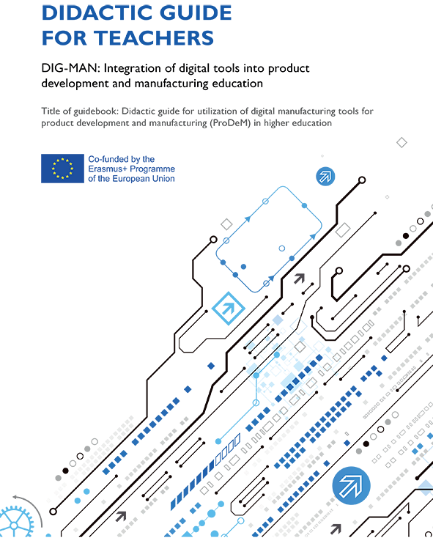Department of Mechanical and Structural Engineering and Materials Science at University of Stavanger is a member of an international consortium that aims at developing didactic materials for integration of digital tools into product development and manufacturing education.

The DIG-MAN project supports the overall objective of the ERASMUS+ programme by bringing four universities and one VET centre into collaboration and joint development of novel outputs (digital tools) for higher education. Countries that are involved are: Estonia, Norway, Poland, Lithuania and Italy.
DIG-MAN supports the horizontal priorities of ERASMUS+ by developing basic skills and key competences (1) and by promoting innovative pedagogies and methods for teaching and learning in a digital era. The DIG-MAN project also supports the higher education related field-specific priorities of ERASMUS+ by tackling skills gaps and mismatches that the learning-outcomes of curricula meet the learning needs of students and being also relevant to the labour market and societal needs (including through better use of open and online, blended, integrated and multidisciplinary learning). The global economy is rapidly becoming digital and Information and Communications Technology (ICT) is no longer a specific sector but the foundation of all modern innovative economic systems. DIG-MAN project is thus an innovation project aiming to support the wider industrial digitalisation goals for what the digital skills of the educators and students of higher education are crucial. The main focus of the project is on the Master's level students/curricula of engineering, manufacturing and product development but the overall hypothesis (that will be also tested during the project) is that these new digital tools could be used universally in all levels of education (mainly in vocational and adult education). For the transferability and outreach, one VET centre in Italy, Centoform, has been involved to coordinate the testing and dissemination of the outputs into other levels of education.
Higher education has to keep pace with the global market needs for the necessary ICT skills and to support these general goals, the main expected results of the DIG-MAN project are:
- The digital skills of the educators are improved with the development of the new "Didactic Guide for utilization of digital manufacturing tools for product development and manufacturing (ProDeM) in higher education" (the Output 1, shortly the "ProDeM Guide" for educators). This new digital guide (handbook) is actively disseminated to other education institutions - not only universities and ohter higher education institutions, but also to other levels of education (please see the Task O1/A3).
- The digital skills and other relevant key competences of the students are improved through the development and adaption of the new "Integrated Digital Workbook for ProDeM students" (Output 2) including the whole product development and manufacturing cycle education. The ProDeM Workbook itself is a digital learning material (to be used on a mobile platform or a computer) including exercises to be solved with problem-based learning (PBL) method.
- In addition to the integrated workbook, new e-learning materials are developed (at least for 12 courses) for product development and manufacturing (please see Output 3). All materials will be developed as Open Educational Ressources (OER).
- Skills of collaborating in team-work, creativity and entrepreneurship will be supported through the ProDeM experiments (please see the Task O3/A2) to validate (and if relevant improve) the newly developed digital learning materials (the new ProDeM Workbook and e-learning materials). In addition to exercises designed with the PBL method, new digital materials will include videos, games and interactive tests collected and developed by the trans-European DIG-MAN team.
The project is co-funded by the European Union through the Erasmus+ Programme - Capacity Building in Higher Education.

